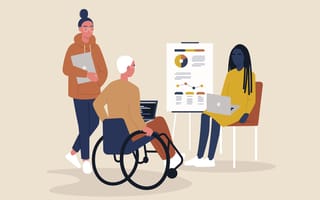
Though a spotlight on racial injustice this year has brought awareness to unconscious bias in the workplace, there’s still a long way to go.
Whether it’s talent acquisition, a promotion or even feedback on a project, unconscious bias may hinder someone from receiving something they deserve and can run rampant through any organization. So, how can HR leaders train employees and implement policies that drive meaningful change?
To start, Carla Pollard-Stewart, senior HR director at healthcare technology company bswift, said that unconscious bias training begins with approaching those who are different than you with increased openness and understanding. “It gives us all the opportunity to temper our biases so that we may all appreciate and learn from each other’s differences in positive ways,” she said.
Michelle Y Bess, vice president, talent and diversity, equity and inclusion at OppLoans, a financial-technology platform, also recognizes the significance of unconscious bias training. “When we take on new perspectives and learn to empathize, we recognize the value in a diversity of representation — in our teams and our lives.”
By the same token, Samantha Gay, onboarding lead at HR software and technology company Envoy Global, emphasizes how gaining new perspectives is essential for fostering inclusive, open-minded workplaces. “Learning about unconscious bias prepares us to slow down reactive judgments, benefiting employees, new hires and managers alike.”
To learn more about how they are challenging the status quo and creating an equitable and inclusive work environment, Built In Chicago caught up with Pollard-Stewart, Bess and Gay.
Healthtech company bswift helps employers choose a benefits administration partner that is tailored to their respective needs. To foster a work environment that is rooted in tolerance, innovation and commitment to growth, Senior HR Director Carla Pollard-Stewart said it’s essential to practice unconscious bias training in the workplace.
Why is unconscious bias training important for the success of a business?
Unconscious bias training is a must for employees, especially considering the wide variety of perspectives and opinions present across an entire workforce. This training can help us bring forth and identify the biases we have and better prevent them from interfering or playing a role in key decisions we make every day in the workplace. The education we gain from exposure to others with different backgrounds in the workplace is essential to our personal and professional growth.
Many of us may come from environments in which we are surrounded by individuals of similar cultures, backgrounds and values. When we come into the workplace, we won’t necessarily know everything about others’ differences, but we should simply approach these differences with increased openness and understanding. Unconscious bias training gives us all the opportunity to temper our biases so that we may all appreciate and learn from each other’s differences in positive ways. Once training has been implemented, consistency in practice and routine assessment is key to maintaining its effectiveness.
A great example of the importance of unconscious bias training and practice is in the area of talent acquisition. It’s essential to consciously identify and look beyond one’s own biases in areas like race, ethnicity and cultural background to determine if an applicant best fits the needs of the team and will challenge them in positive ways. In addition, identifying and working through one’s biases can help ensure that you will be able to effectively support that individual as your colleague, should they join your company.
The education we gain from exposure to others with different backgrounds in the workplace is essential to our personal and professional growth.”
What steps has your company taken to tackle unconscious bias?
For bswift, the diverse population of Chicago provides us ample opportunity to build a diverse workforce that brings diversity of thought and perspective, resulting in greater innovation and high-quality client service.
Additionally, unconscious bias training and diversity programs are top of mind for applicants today. In fact, at bswift we have recently found that many candidates of all levels are asking how we are investing and devoting resources to diversity and inclusion efforts. Ultimately, it’s essential for today’s companies to leverage the right tools and resources, like unconscious bias training, to foster a work environment that is rooted in tolerance, innovation and commitment to growth as an organization.
Envoy Global’s proprietary management platform making it easier for companies to hire and manage international workers. Samantha Gay, an onboarding lead at the company, acknowledges that although humans’ preconceived notions are inevitable, it is important to try and break those associations in order to foster an inclusive work environment.
Why is unconscious bias training important to the success of a business?
Companies need unconscious bias training to help bring awareness to our preconceived notions. The terms “unconscious” and “bias” impact our sociology as humans. If unmonitored, they can impede holistic growth in our workplaces and world.
Our brains have involuntary, self-protective defense mechanisms, often leading to prejudgments and associations. These associations can reinforce our comfort zones, and potentially limit openness to other individuals (i.e., hiring, working strategies, and/or points of view). We cannot reconfigure our brains’ basic functions. However, becoming aware of these mechanisms helps us consciously untangle these associations.
The terms ‘unconscious’ and ‘bias’ impact our sociology as humans. If unmonitored, they can impede holistic growth in our workplaces and world.”
What steps has your company taken to tackle unconscious bias?
At Envoy, I have witnessed the benefits of this awareness. After companywide unconscious bias training, teammates took Harvard’s “Implicit Association Test,” assessing our brains’ preferences for racial groups, body types and more. Many of us had sobering results, indicating unflattering or prejudicial subconscious preferences.
Do any of us feel intentionally prejudicial? Certainly not. Were the results surprising and upsetting to a degree? Absolutely. The crucial lesson is to be aware, extra mindful and careful. Whether we mean to or not, society has impacted our brains’ imaging of what, and who, are “safe” and ‘“comfortable.” Learning about unconscious bias prepares us to slow down reactive judgments. For Envoy, this training is not only essential to maintaining an open and inclusive workplace — it ties directly to our mission in supporting companies and their global talent.
OppLoans’ fintech platform provides consumers access to credit thanks to its personalized program that involves quick approvals, fast funding and low-interest rates. To make its workplace as equitable as its platform, OppLoans’ Vice President, Talent and Diversity, Equity and Inclusion Michelle Y Bess said it’s up to everyone to be more active participants in building a more equitable society.
Why is unconscious bias training important for the success of a business?
Unconscious bias training, broadly focusing on beliefs held about underrepresented groups, has become the go-to practice when addressing issues of diversity, equity and inclusion. But it’s not enough. Bias training isn’t a solution to systemic inequity. It fails to address the significance race plays in our lives, excluding the most marginalized populations and minimizing issues of racism. What we need is anti-racism training to build on the foundation set by bias training. And given the current moment in our country and world, we need it now more than ever.
Being human means holding an inevitable degree of bias, according to the NeuroLeadership Institute. Biases can negatively impact how we move through spaces and how we interact with others in those spaces — which includes the workplace. Unchecked biases can result in inequity.
When you focus on equity and inclusion, your employees benefit from higher levels of engagement, success and satisfaction.”
We must take care to recognize, acknowledge and unlearn the biases that have formed as a result of our very different backgrounds and experiences. By doing so, we can dismantle the systems of our society that were not created with everyone in mind. True equity and inclusion aren’t formed from complacency, but rather by challenging the status quo, parsing out the complexities of our biases and being active participants in building a more equitable society.
The benefits of unconscious bias and anti-racism training are many, for companies and employees. The ROI for diversity, equity, and inclusion (DEI) is measurable at all levels. As we enter another recession, companies whose key employee groups (including women, Black, Indigenous, and People of Color [BIPOC], front-line workers, hourly male workers, and long-tenured employees) had very positive experiences posted a remarkable 14.4 percent gain, according to Great Place to Work. When it comes to hiring practices, the implementation of employee resource groups (ERGs) can increase retention rates by fostering inclusion and belonging. A company that prioritizes taking care of their employees, especially the most vulnerable, is more successful.
As they become a staple in our workforce, millennials and Gen Z folks expect more from their workplaces. These generations are looking for meaning, purpose and a way to serve the common good. When you focus on equity and inclusion, your employees benefit from higher levels of engagement, success and satisfaction. Empowered employees show up as their full selves, sharing powerful contributions for a better business.
Building an inclusive workplace, according to Bess
- Determine the biases within our current systems, processes, and policies. “Which promotion and hiring processes exclude underrepresented groups? In what ways have meetings or office events not considered working parents? Does the office layout and resources we offer inhibit individuals with disabilities?”
- Implement anti-racism training. “In what ways is our company complicit in upholding systemic racism? Which training program can we offer to inform leaders and managers on how to better connect with and support team members?”
- Foster a culture that centers diversity, equity, and inclusion. “How can our company support employee involvement in surfacing biases or inequities? Does our company provide resources for employees to brainstorm solutions to mitigate issues through ERGs or DEI counsels?”
What steps has your company taken to tackle unconscious bias?
Addressing the root of inequity necessitates a twofold approach: creating system-level change and facilitating education. I define system-level change as considering the systems, processes and policies that are biased and disproportionately affect underrepresented groups. Once we’re aware of the systems and processes that are not equitable, we can create new systems that encourage equity and inclusion.
Education keeps bias top of mind so we can mitigate it. A cultural immersion program for leadership teams and managers is a great entry point to address the root cause of biases. The goal is to provide a candid and in-depth look into the complexities, shared experiences and worldviews of underrepresented communities. When we take on new perspectives and learn to empathize, we recognize the value in a diversity of representation — in our teams and our lives.
Amid heightened racial awareness, companies and HR staff are eager to implement bias training. But many fail to deliver when held accountable for their employee demographics. That is why we, as leaders, must instill meaningful, impactful and sustainable change.









